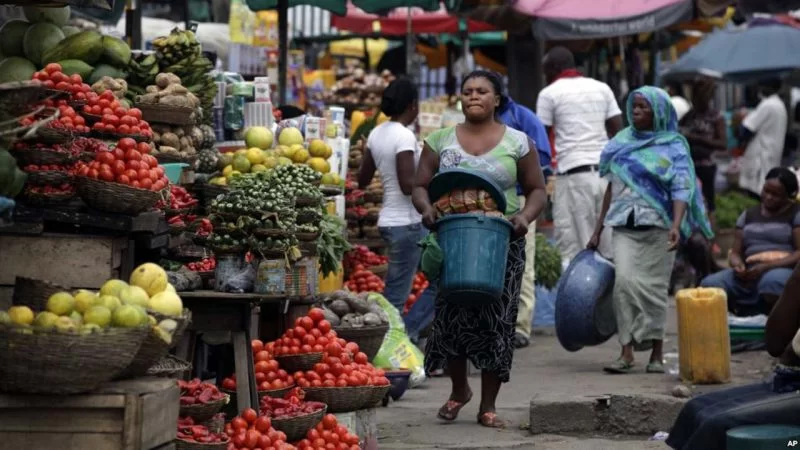By Blossom Chukwu
As the Tinubu Government kicks off amidst several challenges that the removal of Fuel Subsidy has brought on board, it does not stop the country from having an urgent comprehensive plan that will ensure food availability despite the pressing challenges from the Oil and Gas sector. Food remains key in encouraging a healthy society that is vibrant and productive. According to the popular adage that aptly describes what happens when there is lack of food, “a hungry man is an angry man”. With this in mind, there is no way an angry man can produce any sustainable result in a society like Nigeria.
After weighing the current situation in the Food sector, it is clear that Nigeria is still characterised by a high reliance on food imports. Malnutrition is widespread in the entire country and rural areas are especially vulnerable to chronic food shortages, malnutrition, unbalanced nutrition, poor quality foods, high food costs, and even a total lack of food. This phenomenon cuts across all age groups and categories of individuals in the nation.
The fact remains that the problem of Food security in Nigeria has not been adequately and critically dealt with. This is despite various approaches at addressing the challenge that past governments have attempted. The enormous amount of money spent in attempting to assure the Food security of Nigerians without success, calls for a fundamental review of the past approaches, to see what lessons can be learnt, to re-strategise and develop an approach that will ensure better progress towards achieving the first Millennium Development Goal.
Since majority of Nigerians (70 percent) live in rural areas, an analysis of the food and nutrition status of rural dwellers, provides a clear picture of what needs to be done to assure Food security in Nigeria with the attendant improvements in the nutrition status, when all the other necessary conditions, such as adequate health and human resource care, are present.
The socio-economic and political environment at the national and sub-national level is the principal determinant of Food security, since it influences food availability, stability of food supplies, and access to food, which in turn influences the amount of food consumed. When these factors interact with the health and sanitation environment at different levels, they determine the nutritional status of the individual.
Fundamentally, Food insecurity and malnutrition in Nigeria result from non-implementation and/or faulty implementation of the National Food and Nutrition Policy and National Plan of Action for Food and Nutrition. This is why eight years ago, when former President Muhammadu Buhari took office, one of his promises was to diversify the oil-dominated economy by upscaling agricultural productivity. The former President said he was to achieve this through viable investments and enhancing farmers’ capacity, to plug into untapped opportunities across the sector’s value chain.
Though the initiative was highly welcomed, its poor implementation made it a major challenge across the country. The President said then that “Nigerians should “grow what they eat, and eat what they grow,” to boost local food production, increase foreign exchange earnings and reduce the country’s food importation bill significantly. The faulty implementation of this policy has added to the current Food insecurity and malnutrition across the country.
Other reasons identified for the Food insecurity challenge, include unacceptably high levels of poverty in rural households, low priority for nutrition on the agenda of government and resultant poor funding, poor understanding by policymakers of the content of nutrition programmes, in relation to other sectors. As have been earlier identified, this is with inadequate access to healthy environments and health services, as well as various care practices.
These gaps definitely needs to be filled by the current administration, to make progress in changing the food and nutrition situation in Nigeria. Other identified knowledge gaps include the issue of mainstreaming nutrition considerations and activities into poverty reduction, agricultural development policies, and food security interventions. This calls for a need to understand and appreciate the distinctness of nutrition and prioritise its appropriate integration into all sectors and departments, working on Food security in Nigeria.
This suggests why a strategic partnership and collaboration of all stakeholders that will allow for a new direction and plan of action, to seek a comprehensive integration of nutrition and coordination of Food security interventions, among all partners at all levels, particularly in government ministries and agencies, is recommended. This multi-stakeholder and multi-dimensional approach is required for an effective integration and coordination of food and nutrition activities.
One of the food projects that can be closely analysed in this light, is with the Kano River Irrigation Project (KRIP), that grows Rice. The Kano River Irrigation Project (KRIP) is one of the pioneer projects established by the Federal government of Nigeria in 1970. The project is aimed at increasing food production and productivity, improve the beneficiaries’ income, provide employment opportunities and reduce food insecurity.
Rice is cultivated in more than 70% of the cropped area in the Kano River Project. The crop is also one of the most consumed staples in Nigeria. While available statistics shows that Nigerians consumed more than seven million metric tons of Rice in 2020, in recent decades however, insufficient local Rice production to meet the local consumption has emerged, as a significant Food security issue.
Historically, over dependence on rain-fed agriculture, coupled with low investments in irrigated Rice production, made the country rely heavily on Rice imports to meet growing demand. Though the Kano River Irrigation Project (KRIP), has achieved a part of its set objectives for ensuring food security when compared with non-beneficiaries, a lot is still required to standardise the farming situation as it currently stands.
Experts are of the opinion that the nation’s collective ability to meet SDG 2 – Zero hunger by 2030, globally appears elusive unless we take urgent Food action. Over 821 million people were food insecure in 2019, primarily driven by conflict and social unrest. The World Food Programme estimates that this number could exceed 1 billion, given the impact of weather extremes, economic shocks, including job losses, declines in remittances, and disruptions to supply chains and trade.
Bearing these facts in mind, for the Tinubu administration that has just commenced, it comes strongly to mind that Nigeria is still experiencing the same trends as previous administrations have experienced. The rates of malnutrition remain high because nutritious food is unaffordable and not easily accessible for low-income and most vulnerable populations. Rates of obesity are also rising linked to unhealthy food choices and lifestyles.
In addition to these noted facts, our food systems are not yet sustainable, resulting in adverse environmental, economic and social effects, further compounding the pre-existing issues of hunger and food insecurity. The Nigerian food ecosystem is still fragmented and fragile. It has not been diligently leveraged for innovation, technology, and adequate financing to increase farmers’ productivity, reduce the high rates of post-harvest losses, and ensure market linkages.
As a result, many smallholder farmers continue to operate at a subsistence level, with relatively low productivity levels, and limited local processing and access to markets. Understanding where there is an abundance or shortage of food, and who needs it most, will enable actors to design and implement rapid and effective interventions to meet urgent needs. This will also compel policymakers to continue to recognise stakeholders across the sector, as essential workers and enable the free flow of inputs, resources to produce and process food.
This is why the Tinubu administration needs to encourage all actors in the Food ecosystem, to collaborate by sharing information across value chains and among the sub-sectors. This is especially critical during times of crises, given the behaviour of actors around hoarding and price gouging, that is often fostered by fear or misinformation.
Next, the Government needs centralised databases that match the numerous interventions attempting to feed the masses. This would significantly address the mass movement of the unemployed to higher-income communities, where they believe they can find food and minimise the rising rates of unrest and crime.
Finally, the Government must support small and medium-sized enterprises in the agriculture and food landscapes, to redesign their business models to ensure resilience to shocks. This will require that they leverage technology, innovations, and data, to enhance their productivity and agility, and maximise harvests at every point, despite the risks involved.










More Stories
NNPCL raises PMS price to N990 in Abuja, N965 in Lagos
Global survey shows Nigerians lead in AI adoption
Aba records first power outage in one month after vandals attack gas pipelines